‘People’s court’ declares PH gov’t guilty of rights abuses
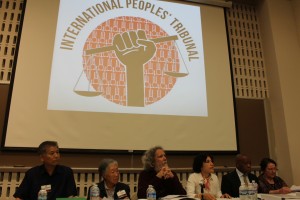
A panel of jurors listen to testimonies by human rights lawyers, survivors and families of victims who traveled from the Philippines to tell their stories. PHOTOS BY JON MELEGRITO
WASHINGTON, D.C. — For six days, more than 200 human rights advocates, student activists, church leaders and community supporters from the U.S. and the Philippines gathered here in the nation’s capital, hoping their voices would be heard by the White House, Congress and other agencies responsible for shaping and implementing public policy towards the Philippines.
Their activities included briefings of congressional staff and State Department senior officials, marches and rallies in front of the White House and the Philippine Embassy and an “International Peoples’ Tribunal (IPT),” a court of public opinion convened from July 16-18.
The IPT heard from human rights lawyers, survivors and families of victims who provided personal accounts of harassment, torture and abuse by Philippine government authorities.
Peoples’ courts, which are independent from any State authority, date back to 1967 when an international group of lawyers, writers and intellectuals convened the “International War Crimes Tribunal” to expose atrocities committed against the Vietnamese people.
In the 1980s, two sessions were held condemning the martial law regime of Ferdinand Marcos. In 2007, a peoples’ tribunal meeting in The Hague, Netherlands found the administrations of George W. Bush and Gloria Macapagal Arroyo “guilty of crimes against humanity.” This year’s hearing was held at the Catholic University of America.
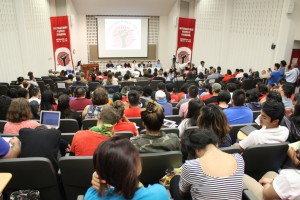
More than 200 observers fill up a Catholic University auditorium during three days of hearings conducted by a Peoples’ Court.
In claiming that the U.S. and Philippine governments are “complicit” partners forged by mutual security agreements, the more than one dozen witnesses accused President Benigno Aquino and President Barack Obama, as their countries’ representatives, “guilty of violations of civil-political rights, socio-economic rights, and right to self-determination.”
These included allegations of “extrajudicial killings, enforced disappearances, violent dispersals, violations of International Humanitarian Law, demolition of urban poor communities, land grabbing, large-scale mining, union-busting, human trafficking and the criminal negligence on typhoon survivors.”
Legally non-binding
After three days of testimonies and deliberations, the court’s seven jurors affirmed the witnesses’ accounts as “very credible” and declared the Philippine and U.S. governments “guilty of gross and systematic violations of human rights in the Philippines.” The “verdict” was delivered to the White House and the Philippine Embassy during a march and rally on July 20.
Although the findings of the panel of human rights lawyers and scholars are considered legally non-binding and unenforceable by administrative means, the IPT convenors argued that they were nevertheless “symbolic” and “significant” especially in the court of public opinion.
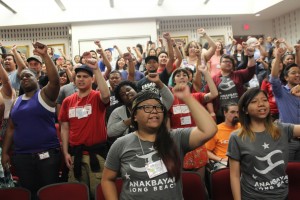
Paula Abad (front, left) joins in a chanting of “Makibaka, Huwag Matakot!” at the end of the three-day International Peoples’ Tribunal held at Catholic University.
Reverend Canon Barry Naylor, chairperson of the International Coalition for Human Rights in the Philippines and one of the IPT’s convenors, said in a statement that “People’s tribunals have had success in directing international attention to grave abuses of human rights in various countries including the Philippines during the Marcos and Arroyo regimes. The IPT draws inspiration and builds on the momentum of previous peoples’ tribunals to advance human rights and hold governments to account.”
Jeannie Mirer, president of the International Association of Democratic Lawyers (IADL), a co-convener, added that “similar people’s tribunals had tremendous impact in shedding light to state abuses and other atrocities in specific contexts,” notably US atrocities during the Vietnam War.
‘Moral force’
Edre Olalia, secretary general of the National Union of Peoples’ Lawyers and IPT’s court clerk, pointed out that as a “tribunal of conscience, it carries more weight due to its political value and moral force,” exposing “the limitations of traditional judicial venue to serve justice for victims of rights violations.”
The convenors, composed mainly of non-government organizations, human rights groups and solidarity groups in the Philippines and the United States, also include the National Lawyers Guild and IBON International.
“Our message is for the victims and the Filipino people to pursue proper remedial measures to prevent the commission or continuance of such illegal and criminal acts,” said juror Azadeh Shahshahani, president of the National Lawyers Guild.
Added juror Michael Yoshii, a leader in the United Methodist Church: “There’s a vacuum of information, almost a silence, about human rights abuses in the Philippines, which are just as bad or even worse than the atrocities committed by Marcos. The American people need to be aware of our own government’s complicity and urge our legislators to change our policies.”
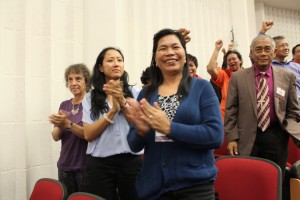
Among the witnesses applauding the jury’s decision is Melissa Roxas (second from left), Maria Aurora Santiago and United Methodist Bishop Solito Toquero.
In 2007, U.S. Senator Barbara Boxer (D-CA) opened hearings on the mounting death squad executions and kidnappings in the Philippines. The following year, the US Senate imposed restriction on military aid to pressure the Arroyo administration to address the involvement of state security forces in various human rights violations. Generally, US foreign aid takes the form of economic, military and development assistance, aimed chiefly for “US security and democracy-building.”
‘A just verdict’
“I am happy. Finally, through this peoples’ court, we really got a just verdict,” said Melissa Roxas, one of the witnesses. A U.S. citizen from Los Angeles, she testified about her own abduction and torture in what she believed to be a military camp while participating in a medical mission to the Philippines in 2009.
“I was handcuffed and blindfolded and for the six days that I was there, I was repeatedly beaten, suffocated and underwent other forms of torture,” she alleged. “Anytime you work with the poor community, they automatically label you as the NPA and they try to vilify your work and justify the abduction and torture.”
Nelson Salvador, another witness whose wife, Fidela Salvador, was allegedly tortured and killed by the Armed Forces of the Philippines, stated: “When you seek justice and justice is so elusive, the verdict addressed a longing that we feel. In a world of injustice, this verdict is so enriching and it fills the emptiness that I’ve had for a long time. The execution of the verdict was for the whole of all Filipinos and I hope it fuels more peoples’ fire for justice.”
The victims and their relatives were represented at the IPT by the Ecumenical Voice for Human Rights and Peace in the Philippines (EcuVoice), KARAPATAN (Alliance for the Advancement of the People’s Rights), Hustisya! (Victims United for Justice), DESAPARECIDOS (Families of the Disappeared for Justice), SELDA (Society of Ex-Detainees Against Detention and Arrest), BAYAN (New Patriotic Alliance), Kilusang Magbubukid ng Pilipinas (Peasant Movement of the Philippines) and Suara Bangsamoro (Voice of the Moro People).
Among the 300 observers who packed Catholic University’s Gowan auditorium on the final day was Paula Abad, 25, a political science graduate from the California State University in Long Beach. “It’s been emotionally overwhelming listening to the witnesses,” she said. “But it’s also very empowering because I can connect their struggles to what I’m going through here in the U.S.” Filipino American young people in this country, she pointed out, are faced with problems like college debt, unemployment, low wages and discrimination in the workplace.
“I’m fired up to fight for justice,” she added. After the verdict was announced, she joined in a chanting of “Makibaka, Huwag Matakot! Struggle onward, have no fear!” Abad traveled to Washington, D.C. with 50 others from Los Angeles to participate in the rallies and advocacy campaigns. She is a member of Anakbayan, a youth and student organization working to “achieve genuine freedom and democracy in the Philippines.”
International support
Jurors who joined the Washington, D.C. tribunal were distinguished lawyers, church leaders and scholars who come from different parts of the world: Shahshahani has worked for a number of years defending the human rights of immigrants and Muslim, Middle Eastern, and South Asian communities; Camilo Pérez-Bustillo of Colombia served as Director of Immigrant and Refugee Rights at the American Friends Service Committee (AFSC); Reverend Molefe Tsele is an ordained minister with the Evangelical Lutheran Church in Southern Africa; Reverend Malcolm Damon of Zimbabwe is a founding member of the Economic Justice Network (EJN); Beijing-born Pao-yu Ching is a college professor and published author on globalization; Japanese American Michael Yoshii has won awards for his racial justice work; Mary Boyd, an Antigonish native, is recognized as one of Canada’s outstanding social justice leaders.
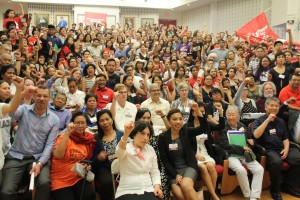
Observers, witnesses, lawyers and jurors demonstrate their solidarity at the conclusion of the peoples’ court in Washington, D.C.
Adding weight to the IPT’s proceedings was the recent action of an international group of lawyers calling on the Department of Justice (DOJ) in the Philippines to take immediate steps to address cases of torture in the country, citing how it “is still rife” and “appears to be routine during interrogations by police officers.”
In a statement sent through Amnesty International (AI), the bar associations of Germany, Denmark, Belgium, Norway, France and the Philippines expressed alarm over persistent reports of torture attributed to law enforcers.
They called on DOJ to take “concrete action to ensure those responsible are brought to justice through prompt, impartial, independent and effective investigations into all reports of torture and other ill-treatment by law enforcement officials leading to robust prosecutions in court.”
Like us on Facebook














